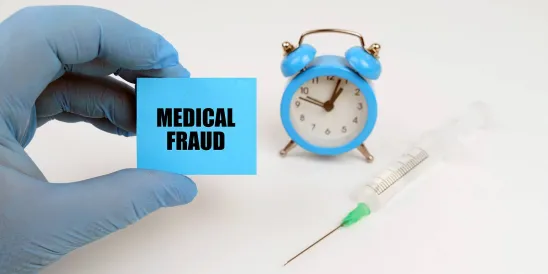On Feb. 8, 2023, the U.S. Department of Justice (DOJ) announced that in the fiscal year ending Sept. 30, 2022, the government recovered more than $2.2 billion from 351 settlements and judgments under the False Claims Act, for an average recovery of $6.2 million per settlement/judgment. While this data reflects the second-highest number of settlements and judgments under the False Claims Act in a single year, the amount of money recovered was the lowest it has been in more than a decade, with over half of the recoveries ($1.1 billion) attributable to qui tam (otherwise known as whistleblower) matters in which the government declined to intervene.
Notably, despite total recoveries under the False Claims Act falling more than 50 percent in comparison to FY 2021, whistleblower share awards almost doubled. In fact, recoveries from whistleblower matters in which the government declined to intervene were the highest they have been in recorded history.
Unsurprisingly, given recent trends in government priorities, a significant portion of the recoveries pertained to matters involving the healthcare industry. Recoveries for healthcare-related matters totaled $1.7 billion, or roughly 77 percent, of all False Claims Act recoveries in FY 2022. These recoveries involved a variety of healthcare defendants, including drug and medical device manufacturers, durable medical equipment, home health and managed care providers, hospitals, pharmacies, hospice organizations, and physicians. These numbers do not include recoveries for state Medicaid programs.
More than half of the recoveries from the healthcare industry in FY 2022 resulted from matters in which whistleblowers went it alone without the government’s support, resulting in $1 billion of recovery for the government and almost $300 million in whistleblower share awards. This is the highest amount recovered by healthcare whistleblowers going it alone in a single year—a figure that may embolden whistleblowers to pursue more False Claims Act matters. And while overall and healthcare-specific False Claims Act recoveries alike dipped, there is no doubt the government will continue to prioritize fraud in the healthcare industry. Last fiscal year, roughly one-third of new matters filed by the government and more than half of the new whistleblower-only matters involved the healthcare industry.
Furthermore, despite the fact that the recoveries from False Claims Act matters filed directly by the government were the lowest they have been since FY 2017, this amount is not an indication of a slowdown in the government’s False Claims Act enforcement activity. In fact, the total number of new matters opened by the government increased in FY 2022, with the government opening 296 new matters (up from 212 in FY 2021), 93 of which relate to the healthcare industry. Similarly, whistleblowers continue to enter the False Claims Act ring at a rapid pace, filing 652 qui tams in FY 2022 (up from 598 in FY 2021), with 371 of those qui tams related to the healthcare industry.
Enforcement Priorities
The government, in conjunction with its release of the False Claims Act enforcement data, highlighted the following healthcare-specific priorities: fraud and abuse in the Medicare and Medicaid Programs, fraud based on unnecessary services and substandard care, and COVID-19 related fraud. The government confirmed that it will continue to use the False Claims Act to target fraud by individuals as well as corporations.
Although the government did not highlight any recoveries under the Medicare Advantage program, it noted that during 2022, it “pursued cases alleging that organizations participating in the Medicare Advantage (or Medicare Part C) program knowingly submitted or caused the submission of inaccurate information or knowingly failed to correct inaccurate information about the health status of beneficiaries enrolled in their plans to increase reimbursement.” The release specifically pointed to several pending Medicare Advantage matters, including those involving Independent Health Corporation and Kaiser Permanente.
The government’s announcement comes on the heels of the Centers for Medicare & Medicaid Services’ (CMS) recent issuance of a final rule permitting the government to extrapolate overpayments determined through certain Risk Adjustment Data Validation (RADV) audits, which will almost certainly increase the amounts of overpayments identified by the government going forward.
The government also indicated that it will continue to focus on fraud in pandemic relief programs and alleged violations of cybersecurity requirements in government contracts and grants. In particular, the government over the past year has pursued a number of False Claims Act matters under the Paycheck Protection Program (PPP), recovering more than $6.8 million from 35 False Claims Act matters.
The government also plans to extend its focus on fraud related to the pandemic to the misuse of other pandemic-related resources and relief programs, including diversion of COVID-19 vaccinations to ineligible persons. Notably, the Health Resources & Services Administration (HRSA) recently announced it will be sending out final repayment notices for providers who failed to submit required reporting requirements or used relief funds for noncompliant purposes.
Key Takeaways
Despite the diminished total amount of recoveries under the False Claims Act in FY 2022, this drop does not reflect a slowdown in the government’s enforcement in this space. In fact, the number of settlements and judgments in FY 2022 were the second-highest in history, and the number of new matters filed by both the government and whistleblowers increased over the last fiscal year. Roughly 12 new False Claims Act matters were opened each week in FY 2022, nine of which related to the healthcare industry.
The increase in whistleblower-only new matters demonstrates the willingness of whistleblowers to go it alone without the government’s involvement and support, and the substantial whistleblower-only recovery amounts will likely only encourage this trend. In fact, it is likely that whistleblowers will take an increasingly aggressive approach under the False Claims Act given the significant awards these cases can yield. To minimize potential future liabilities under the False Claims Act, those involved in the healthcare industry should consider prioritizing compliance with a particular interest in the same focus areas of the government, including fraud in the Medicare and Medicaid Programs, unnecessary services, substandard care, and fraud relating to COVID-19 programs and funding.





 />i
/>i

